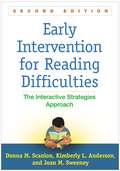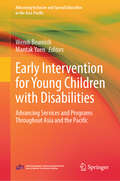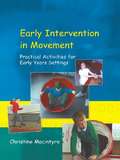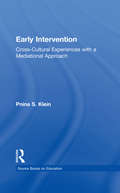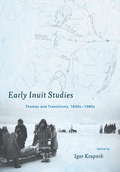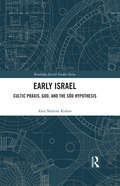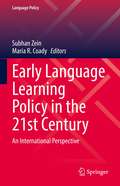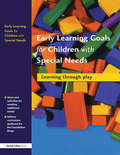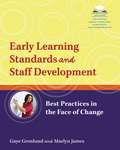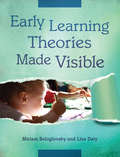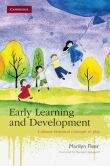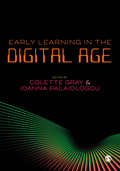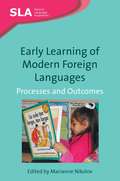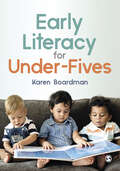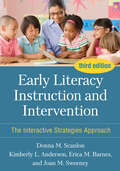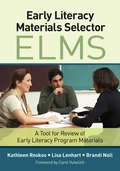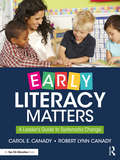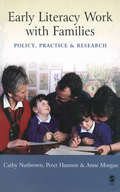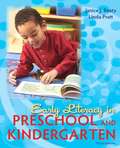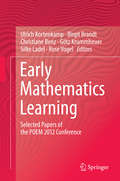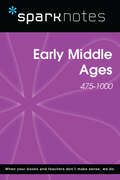- Table View
- List View
Early Intervention for Reading Difficulties: The Interactive Strategies Approach
by Joan Sweeney Donna Scanlon Kimberly AndersonGrounded in a strong evidence base, this indispensable practitioner guide and text has given thousands of teachers tools to support the literacy growth of beginning and struggling readers in grades K-2. The interactive strategies approach (ISA) is organized around core instructional goals related to enhancing word learning and comprehension of text. The book provides guidance for assessment and instruction in whole-class, small-group, and one-to-one settings, using the curricular materials teachers already have.
Early Intervention for Young Children with Disabilities: Advancing Services and Programs Throughout Asia and the Pacific (Advancing Inclusive and Special Education in the Asia-Pacific)
by Wendi Beamish Mantak YuenThis book focuses on the provision of early intervention for children with disabilities (0-6 years) and their families throughout the Asia-Pacific. The motivation for the book stems from a policy brief by the Economic and Social Commission for Asia and the Pacific (ESCAP) issued in 2021. This brief urgently called for young children with disabilities to be identified and to receive intervention and support in lower-income countries throughout Asia and the Pacific. The ESCAP has estimated that at least 33% of young children with disabilities across the region currently lack any service or support to optimise their development before entering school. This book seeks to inform policy and provision within lower-income countries by providing policymakers in government and non-government organisations with practical guidelines. In particular, it presents real-world frameworks and promising programs to assist in establishing and delivering early intervention services that cater to local needs and demands. It also introduces personnel in the field to recommended intervention practices and strategies that support children with diverse disabilities across the age range birth 6 years. It also includes suggestions and strategies for supporting and collaborating with the children&’s families. Importantly, when blended with early child development material, these practices and strategies constitute essential topics for ongoing professional development and training activities. The concluding chapter also presents a critical analysis and synthesis of policies, service models, and programs across the Asia-Pacific region. From this analysis, recommendations are presented with likely translatability to countries at different stages of development in delivering quality early intervention to this vulnerable group of children.
Early Intervention in Movement: Practical Activities for Early Years Settings
by Christine MacintyreThis text is full of practical ideas to help all early years children enjoy developing their movement abilities. Each activity uses rhymes and jingles and some have music. This is to enhance the children's rhythmic ability, their listening skills and their phonological awareness. There are many activities that form the basis of lesson plans. The material shows how the learning outcomes fulfil the criteria set out in the Curriculum Guidance for the Foundation Stage and the 5-14 Guidelines (Expressive Arts). The activities will be great fun for all children, whether they find movement easy and are always on the look-out for challenges, or whether they are less confident. The book aims to support teachers in their work to help all children fulfill their potential, offering guidance on diagnosis and assessment of skills and weaknesses as well as observation and progression. Chapters include developing the basic movement patterns: gross movements, fine movements and manipulative skills; developing sensory integration; teaching and observing movement; and detailed lesson plans. All children, whatever their level of ability, can be helped to be more confident and competent movers - a process which often also results in improved self-esteem. Teachers and support staff in all early years settings will find much in this book to inspire and enthuse all children in their care.
Early Intervention: Cross-Cultural Experiences with a Mediational Approach (Source Books on Education #Vol. 44)
by Pnina S. KleinFirst published in 1996. This book presents a new theoretical and practical model for early intervention: the Mediational Intervention for Sensitizing Caregivers (MISC). Aid agencies including the World Health Organization (WHO), UNICEF, and Redd Barna supported research projects on the implementation of this approach with poor, high-risk children in various countries. This book presents reasons for implementation, processes of intervention, and some outcomes of the MISC approach in six countries: Israel, Sweden, USA, Ethiopia, Sri Lanka, and Indonesia.
Early Inuit Studies
by Igor KrupnikThis collection of 15 chronologically arranged papers is the first-ever definitive treatment of the intellectual history of Eskimology--known today as Inuit studies--the field of anthropology preoccupied with the origins, history, and culture of the Inuit people. The authors trace the growth and change in scholarship on the Inuit (Eskimo) people from the 1850s to the 1980s via profiles of scientists who made major contributions to the field and via intellectual transitions (themes) that furthered such developments. It presents an engaging story of advancement in social research, including anthropology, archaeology, human geography, and linguistics, in the polar regions. Essays written by American, Canadian, Danish, French, and Russian contributors provide for particular trajectories of research and academic tradition in the Arctic for over 130 years. Most of the essays originated as papers presented at the 18th Inuit Studies Conference hosted by the Smithsonian Institution in October 2012. Yet the book is an organized and integrated narrative; its binding theme is the diffusion of knowledge across disciplinary and national boundaries. A critical element to the story is the changing status of the Inuit people within each of the Arctic nations and the developments in national ideologies of governance, identity, and treatment of indigenous populations. This multifaceted work will resonate with a broad audience of social scientists, students of science history, humanities, and minority studies, and readers of all stripes interested in the Arctic and its peoples.
Early Israel: Cultic Praxis, God, and the Sôd Hypothesis (Routledge Jewish Studies Series)
by Alex Shalom KohavEarly Israel offers the most sweeping reinterpretation of the Pentateuch since the nineteenth-century Documentary Hypothesis. Engaging a dozen-plus modern academic disciplines—from anthropology, biblical studies, Egyptology and semiotics, to linguistics, cognitive poetics and consciousness studies; from religious studies, Jewish studies, psychoanalysis and literary criticism, to mysticism studies, cognitive psychology, phenomenology and philosophy of mind—it wrests from the Pentateuch an outline of the heretofore undiscovered ancient Israelite mystical-initiatory tradition of the First Temple priests. The book effectively launches a new research area: Pentateuchal esoteric mysticism, akin to a "center" or "organizing principle" discussed in biblical theology. The recovered priestly system is discordant vis-à-vis the much-later rabbinical project. This volume appeals to a diverse academic community, from Biblical and Jewish studies to literary studies, religious studies, anthropology, and consciousness studies.
Early Language Learning Policy in the 21st Century: An International Perspective (Language Policy #26)
by Subhan Zein Maria R. CoadyThis volume analyses the policymaking, expectations, implementation, progress, and outcomes of early language learning in various education policy contexts worldwide. The contributors to the volume are international researchers specialising in language policy and early language learning and their contributions aim to advance scholarship on early language learning policies and inform policymaking at the global level. The languages considered include learning English as a second language in primary schools in Japan, Mexico, Serbia, Argentina, and Tanzania; Spanish language education in the US and Australia; Arabic as a second language in Israel and Bangladesh; Chinese in South America and Oceania; and finally, early German teaching and learning in France and the UK.
Early Learning Environments That Work
by Rebecca Isbell Betty ExelbyThe classroom environment is a vital part of child's learning experience. Early Learning Environments that Work! explores how to manipulate furniture, color, materials, storage, lighting, and more to encourage learning through classroom arrangement. Each chapter gives you detailed illustrations and photographs to help you set up or arrange what you already have in the classroom.
Early Learning Goals for Children with Special Needs: Learning Through Play
by Collette DrifteIn this book practitioners will find clear and workable suggestions for opening up the Early Learning Goals to children with special educational needs. It will help them to use each work area of the early years setting as a means to teach the curriculum, and offers plenty of down-to-earth advice on activities to try with children who have additional needs. Following the curriculum guidance laid down for the Foundation Stage, the author provides ideas for managing specific types of disability within the mainstream setting. Play is the focus throughout the book as the means of helping children to learn. There are photocopiable activity sheets at the end of each chapter, together with a concise list of further reading. Useful resources and contact addresses are included.
Early Learning Standards and Staff Development
by Marlyn James Gaye GronlundEarly Learning Standards and Staff Development helps directors and trainers guide early childhood staff to fulfill learning standards, often without compromising best practices. Written by respected consultants Gaye Gronlund and Marlyn James, it is one of few books on staff development in the area of learning standards.The book includes activities for reflecting on issues such as how much teachers should direct each type of classroom activity, and helps staff developers assist teachers in strengthening their observation and documentation skills. The book comes with a DVD featuring video vignettes to accompany the observation exercises, as well as PowerPoint training aids.
Early Learning Theories Made Visible
by Miriam Beloglovsky Lisa DalyGo beyond reading about early learning theories and see what they look like in action in modern programs and teacher practices. With classroom vignettes and colorful photographs, this book makes the works of Jean Piaget, Erik Erikson, Lev Vygotsky, Abraham Maslow, John Dewey, Howard Gardner, and Louise Derman-Sparks visible, accessible, and easier to understand. Each theory is defined--through engaging stories and rich visuals--in relation to cognitive, social-emotional, and physical developmental domains. Use this book to build a stronger comprehension of the foundations of early learning theories and become more reflective and intentional in your work with young children.
Early Learning and Development
by Marilyn FleerEarly Learning and Development provides a unique synthesis of cultural-historical theory from Vygotsky, Elkonin and Leontiev in the 20th century to the ground-breaking research of scholars such as Siraj-Blatchford, Kratsova and Hedegaard today. It demonstrates how development and learning are culturally embedded and institutionally defined, and it reflects specifically upon the implications for the early childhood profession. Divided into three parts, with succinct chapters that build upon knowledge progressively, the everyday lives of children at home, in the community, at preschool and at school are discussed in the context of child development and pedagogy. The book explicitly problematises the foundations of early childhood education, inviting postgraduates, researchers and academics to drill down into specific areas of international discourse, and extending upper-level undergraduates beyond the fundamental underpinnings of their learning. Ultimately Early Learning and Development offers new models of 'conceptual play' practice and theory within a globally resonant, cultural-historical framework.
Early Learning in the Digital Age: Digital Pedagogy And Early Childhood
by Ioanna Palaiologou Colette GrayDigital practices are forging ahead in leaps and bounds. Examining digital practices in early childhood education, this book seeks to inform the discussion on how digital technologies are best integrated into play-based pedagogy, and demonstrates effective practices that enhance children’s learning and development. With a range of international contributors, perspectives, and case studies, the fusion of play and portable technology is explored through contemporary research.
Early Learning in the Digital Age: Digital Pedagogy And Early Childhood
by Ioanna Palaiologou Colette GrayDigital practices are forging ahead in leaps and bounds. Examining digital practices in early childhood education, this book seeks to inform the discussion on how digital technologies are best integrated into play-based pedagogy, and demonstrates effective practices that enhance children’s learning and development. With a range of international contributors, perspectives, and case studies, the fusion of play and portable technology is explored through contemporary research.
Early Learning of Modern Foreign Languages
by Marianne NikolovModern languages are offered to young learners at an increasingly early age in many countries; yet few publications have focused on what is available to children in different contexts. This volume fills this gap by documenting the state-of-the-art in researching young language learners using a variety of research methods. It demonstrates how young children progress and benefit from an early exposure to modern languages in different educational contexts, and how affective, cognitive, social, linguistic and classroom-related factors interact in the processes. A special strength is the range of languages: although English is the most widely learnt language, chapters focus on various target languages: Croatian, French, English, German, Italian, Spanish and Ukrainian and the contexts include China, Croatia, Greece, Hungary, Ireland, Norway, Poland, the Ukraine, and the United Kingdom.
Early Literacy For Under-Fives
by Karen BoardmanEmbracing a multi-modal approach to early literacy, this textbook supports students as aspiring early years professionals with their understanding of early reading for under-fives and the critical links to language, literacy, and learning. This book looks at early literacy in all its forms including mark-making, sharing stories, making music and covers the breadth of literacy learning opportunities that take place outdoors and in museums, art galleries and more. With chapters on phonics, the deficit model, digital literacies and storytelling, this book is packed with everything you need to support you on your degree and help you to develop into a literacy advocate for under-fives. This key text features individual chapter overviews that enable you to review and rethink, activities that bring theory into practice, and engaging case studies to provoke deeper thought. With reflection points, and ′review and rethinking pedagogy′ sections, this interactive book emphasises the importance of engaging young children with early literacy activities.
Early Literacy For Under-Fives
by Karen BoardmanEmbracing a multi-modal approach to early literacy, this textbook supports students as aspiring early years professionals with their understanding of early reading for under-fives and the critical links to language, literacy, and learning. This book looks at early literacy in all its forms including mark-making, sharing stories, making music and covers the breadth of literacy learning opportunities that take place outdoors and in museums, art galleries and more. With chapters on phonics, the deficit model, digital literacies and storytelling, this book is packed with everything you need to support you on your degree and help you to develop into a literacy advocate for under-fives. This key text features individual chapter overviews that enable you to review and rethink, activities that bring theory into practice, and engaging case studies to provoke deeper thought. With reflection points, and ′review and rethinking pedagogy′ sections, this interactive book emphasises the importance of engaging young children with early literacy activities.
Early Literacy Instruction and Intervention: The Interactive Strategies Approach
by Donna M. Scanlon Kimberly L. Anderson Erica M. Barnes Joan M. SweeneyThis established text and teacher resource is now in a revised and updated third edition, with a broader focus on whole-class instruction as well as small-group and individualized intervention. The evidence-based Interactive Strategies Approach (ISA) provides a clear framework for supporting literacy development in grades K–3, particularly for students who experience reading difficulties. The book gives teachers the knowledge needed to more effectively use existing curricular materials to meet core instructional goals in the areas of phonemic awareness, phonics, word solving/word learning, vocabulary and language skills, and comprehension. Twenty-six reproducible forms can be copied from the book or downloaded and printed from the companion website. Of special value, the website also features approximately 200 pages of additional printable assessment tools and instructional resources. Prior edition title: Early Intervention for Reading Difficulties. New to This Edition *Increased attention to whole-class instruction, teaching linguistically diverse students, writing development, and language–literacy connections. *More examples of explicit instructional language, including sample scripts. *Incorporates the latest research about early literacy development and difficulties. *End-of-chapter "key points" and an end-of-book glossary. *Additional online-only reproducible tools, including ISA lesson sheets.
Early Literacy Materials Selector (ELMS): A Tool for Review of Early Literacy Program Materials
by Lisa A. Lenhart Kathleen A. Roskos Brandi L. NollYour all-in-one guide to selecting the very best early literacy materials! Learning to read and write is too important to be left to chance, so it's absolutely critical that the early literacy curriculum and literature you use in PreK and kindergarten environments reflect the very best research and instructional practices. Early Literacy Materials Selector (ELMS) provides all the step-by-step guidance you need to: Recognize the characteristics of high-quality literacy materials; Work in teams or individually to evaluate your resources; Understand the importance of the research base; Establish a baseline against which new literacy materials can be compared.
Early Literacy Matters: A Leader's Guide to Systematic Change
by Robert Lynn Canady Carol E. CanadyEarly Literacy Matters is an innovative action guide for elementary school leaders and instructional coaches dedicated to accelerating literacy performance in the early grades, when prevention of reading difficulties matters most. As a unique father-daughter team with combined expertise in literacy education and instructional leadership, the authors share best practices for literacy success. Readers will learn how to… establish and lead a literacy team, implement embedded professional development, utilize key assessments to frame daily instruction, and illustrate specific organizational and scheduling models needed to support systemic change based on the science of reading. Each chapter features reflection questions and explicit strategies and tools leaders can implement immediately in today’s classrooms.
Early Literacy Work with Families: Policy, Practice and Research
by Cathy Nutbrown Peter Hannon Anne Morgan`The ′Raising Early Achievement in Literacy′ or REAL project was the result of a collaboration between the University of Sheffield, Sheffield LEA and schools and centres across the city of Sheffield, starting in 1995. For those interested in developing their own projects in this field it will provide essential information. It contains many examples of work carried out this in this project. Many examples are given that could prompt practitioners to identify ways in which they too could focus their own input with children or help their parent group to interact with their children′s developing literacy′ - Early Years Update `A "must read" for practitioners, policy makers and researchers interested in the detail and the theory underpinning this important family literacy initiative′ - Neil McClelland OBE, Director, National Literacy Trust `The REAL Project is one of the best conceptualized, most intensively documented and successful British family literacy initiatives and the book provides a comprehensive overview of all aspects of this powerful project. It is essential reading for anyone working alongside families to promote children′s early development′ - Professor Nigel Hall, Institute of Education, Manchester Metropolitan University ′The project described in detail in this book is arguably the most important and well-researched UK initiative for developing early literacy work with parents of young children. ... Readers will find inspirational case studies ... There are illuminating insights into children′s perspectives on family literacy, including good news about fathers and boys. ... Don′t miss it!′ - Marian Whitehead, Nursery World Anyone involved in the field of early-childhood literacy should be familiar with the work of the REAL (Raising Early Achievement in Literacy) Project. Here, leading members of the project team Cathy Nutbrown, Peter Hannon and Anne Morgan, discuss the research. An essential guide to the subject, this book will be of great practical use to all in the field of early childhood literacy: students, practitioners and course leaders on literacy and early childhood courses. The authors discuss the policy contexts of early-childhood and literacy today and use their experience of the REAL project to discuss and illustrate practical research and evaluation strategies for family literacy workers. They examine the issues from all perspectives: teachers, parents and young children. The book concludes with examples of how the theoretical framework of the REAL Project (ORIM) has been used by other practitioners and an examination of the implications of such work for the future of early-childhood and literacy policy development. The book also includes: - An informative update on research in the field - A description of the family literacy programme - Useful activities for family literacy work - Guidelines for interviewing parents and children - Suggestions for how to evaluate family literacy work - Ideas for practical sessions for professional development for family literacy workers - A Guide to further reading This is an important book and should be read by anyone wishing to keep pace with the field of family literacy in early childhood education.
Early Literacy in Preschool and Kindergarten
by Janice J. Beaty Linda PrattEarly Literacy in Preschool and Kindergarten: A Multicultural Perspective is an applied book focusing on how literacy develops in young children and the ways in which teachers can encourage the natural emergence of early reading and writing. It has a special emphasis on multicultural children's literature, including detailed descriptions of over 200 multicultural children's books. Packed with practical supports and strategies for teachers, such as how to set up a literacy-friendly environment; using music and art as natural languages; strengthening finger muscles for writing through 3-D art; developing visual representational skills in drawing, leading to writing; and using early literacy checklists to help understand children's capabilities, it provides many suggestions for using classroom materials and centers to support literacy. While most early literacy texts treat preschool learning in a chapter or two, this entire text focuses on early literacy in the preschool, leading up to children's accomplishments in kindergarten. Early Literacy in Preschool and Kindergarten: A Multicultural Perspective, Third Edition, presents an updated approach to exploring literacy with preschool and kindergarten children. The current recognition that learning to read and write can emerge naturally in young children has led the authors to develop a fresh approach by using classroom learning centers and multicultural children's literature to involve children in their own learning.
Early Mathematical Explorations
by Deborah Butler Nicola Yelland Carmel DiezmannEarly Mathematical Explorations shows readers how to provide young children with rich mathematical learning environments and experiences. This book presents teachers with a sound theoretical framework to encourage children to become numerate in the 21st century. It shows that mathematical learning can occur in a variety of ways, including when children explore ideas through play, problem solving and problem posing; engage in a rich variety of multimodal learning experiences; pursue self-directed activities and cooperate with others; and make connections between ideas and experiences in their everyday worlds. Chapters 2 and 3 explore the ways in which mathematical understandings can be supported from birth to five years. Chapters 4-9 provide an overview of mathematics in the early primary years. The final chapters illustrate the contexts and connections that can be made in early mathematical learning. Early Mathematical Explorations is an essential resource for pre- and in-service teachers alike.
Early Mathematics Learning
by Ulrich Kortenkamp Birgit Brandt Christiane Benz Götz Krummheuer Silke Ladel Rose VogelThis book will gather current research in early childhood mathematics education. A special focus will be the tension between instruction and construction of knowledge. The book includes research on the design of learning opportunities, the development of mathematical thinking, the impact of the social setting and the professionalization of nursery teachers.
Early Middle Ages (SparkNotes History Notes)
by SparkNotesEarly Middle Ages (475-1000) (SparkNotes History Note) Making the reading experience fun! SparkNotes History Guides help students strengthen their grasp of history by focusing on individual eras or episodes in U.S. or world history. Breaking history up into digestible lessons, the History Guides make it easier for students to see how events, figures, movements, and trends interrelate. SparkNotes History Guides are perfect for high school and college history classes, for students studying for History AP Test or SAT Subject Tests, and simply as general reference tools.Each note contains a general overview of historical context, a concise summary of events, lists of key people and terms, in-depth summary and analysis with timelines, study questions and suggested essay topics, and a 50-question review quiz.
